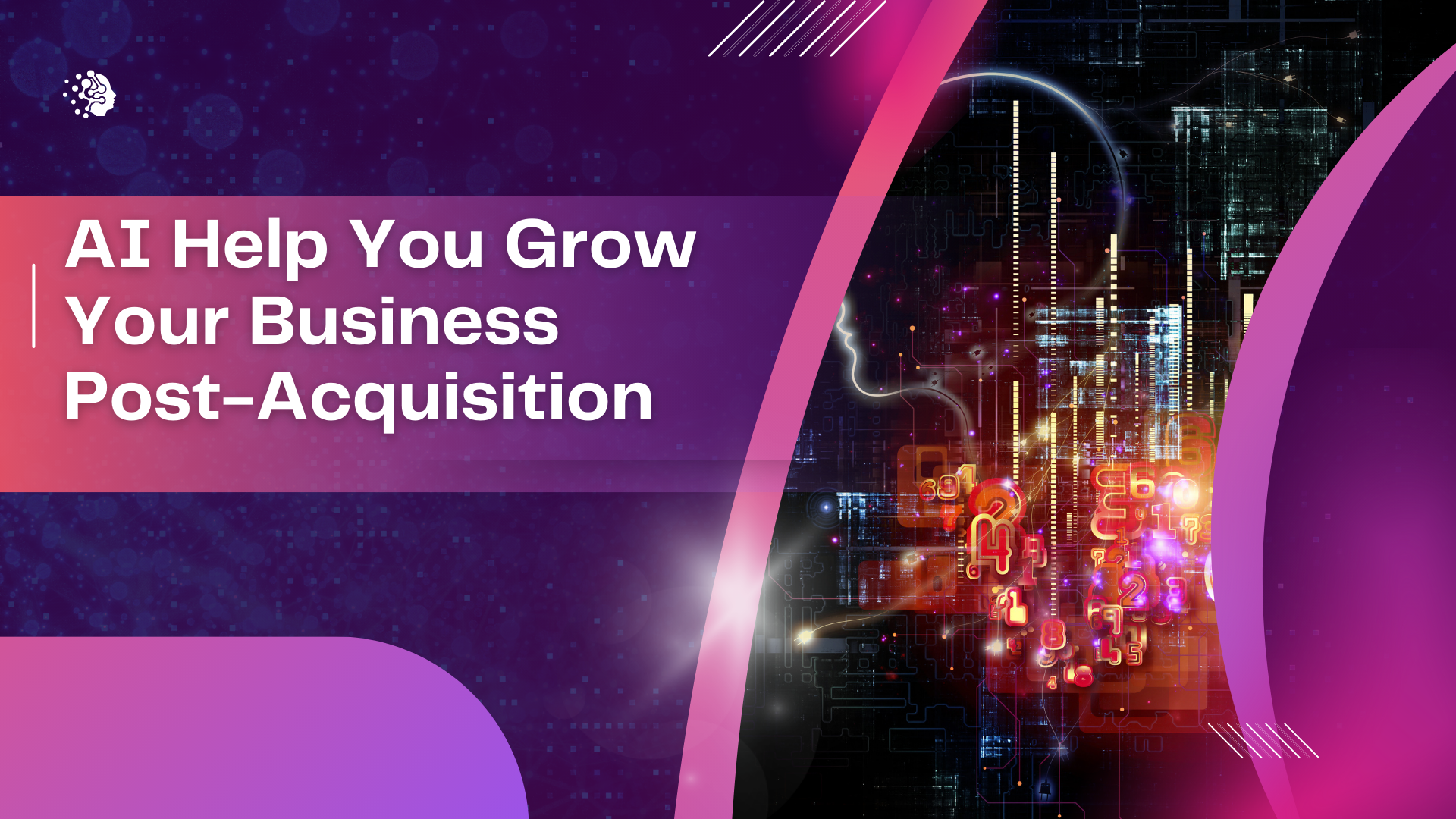
Acquiring a digital business is a major investment, so maximizing your return and achieving profitability requires rapid and efficient scaling. While growing a digital business post-acquisition can be challenging, leveraging artificial intelligence (AI) can significantly expedite this process and enhance profitability.
Context
AI technology has recently become more accessible and affordable, even for smaller companies. Today, businesses of all sizes, from startups to established enterprises, are using AI-driven tools and software to scale operations, enhance online visibility, boost efficiency, and improve customer relationships.
To effectively harness the power of AI for your business, it’s essential to understand what AI is and explore how it can be applied to drive growth and profitability in your digital business.
What is artificial intelligence
Artificial Intelligence refers to the simulation of human intelligence in machines designed to think and learn like humans. AI encompasses various technologies, including:
- Machine Learning: Algorithms that enable computers to learn from and make predictions based on data.
- Natural Language Processing: The ability of AI to understand and generate human language.
- Computer Vision: AI’s capability to interpret and make decisions based on visual inputs.
- Robotic Process Automation: Using AI to automate repetitive tasks and processes.
Key Areas to Use AI for Growing Your Digital Business
It’s important to understand the different concepts in artificial intelligence that help solve real-world problems. This can be done by implementing processes and techniques like machine learning, which is a branch of artificial intelligence.These are some key areas to use AI in order to grow your business:
1. Customer Experience and Engagement
- Chatbots and Virtual Assistants: These can handle customer inquiries, provide support, and guide users through your services 24/7.
- Personalization: AI algorithms can analyze customer behavior and preferences to deliver personalized content, product recommendations, and offers.
2. Marketing and Advertising
- Targeted Advertising: AI can analyze vast amounts of data to optimize ad campaigns, targeting the right audience segments with tailored messages.
- Content Creation: AI tools can help generate and optimize content for blogs, social media, and email campaigns, enhancing your marketing efforts.
3. Sales and Lead Generation
- Predictive Analytics: AI can forecast sales trends, identify potential leads, and recommend strategies to boost sales.
- Lead Scoring: AI algorithms can score leads based on their likelihood to convert, helping sales teams prioritize their efforts.
4. Operational Efficiency
- Process Automation: AI can automate routine tasks such as data entry, invoicing, and inventory management, freeing up human resources for more strategic work.
- Supply Chain Management: AI can optimize supply chain operations, forecast demand, and manage inventory more efficiently.
5. Data Analysis and Insights
- Data Mining: AI can analyze large datasets to uncover patterns and insights that drive strategic decision-making.
- Real-time Analytics: AI tools can provide real-time insights into business performance, allowing for swift adjustments and improvements.
6. Customer Insights and Feedback
- Sentiment Analysis: AI can analyze customer reviews and feedback to gauge sentiment and identify areas for improvement.
- Behavioral Analysis: AI can track and analyze user behavior on your website or app to understand engagement and identify optimization opportunities.
7. Fraud Detection and Security
- Anomaly Detection: AI can identify unusual patterns in transaction data, helping to detect and prevent fraudulent activities.
- Cybersecurity: AI can enhance security measures by monitoring for threats and responding to potential breaches more swiftly.
Implementing AI in Your Digital Business
- Assess Your Needs: Identify the areas where AI can have the most significant impact based on your business goals and challenges.
- Choose the Right Tools: Select AI tools and platforms that align with your specific needs, whether they are for marketing, customer service, or operations.
- Integrate and Train: Ensure seamless integration of AI tools with your existing systems and invest in training for your team to maximize the benefits.
- Monitor and Optimize: Continuously monitor AI performance and make data-driven adjustments to enhance its effectiveness.
By strategically implementing AI, you can streamline operations, enhance customer experiences, and make more informed decisions, ultimately accelerating growth and improving profitability.
10 ways AI can help you grow your new business
Leveraging AI can significantly accelerate the growth and profitability of your new business. By selecting the right software and digital tools, you can enhance your brand’s or website’s online visibility, increase engagement rates with your content, and deliver a better user experience. This strategic use of technology can help you achieve rapid growth and financial success.
1. Enhance Customer Support:
AI-driven chatbots and virtual assistants can provide instant, 24/7 support, handle common inquiries, and offer personalized responses, improving overall customer service and satisfaction.
2. Optimize Marketing Strategies:
AI can analyze customer data to create targeted marketing campaigns, personalize content, and adjust strategies in real-time based on performance metrics, leading to more effective marketing efforts.
3. Automate Administrative Tasks:
Streamline repetitive tasks such as scheduling, data entry, and invoicing with AI automation tools, allowing your team to focus on higher-value activities and increasing operational efficiency.
4. Analyze Data for Insights:
AI-powered analytics can process large volumes of data to identify trends, patterns, and opportunities, helping you make informed decisions and develop strategies that drive growth.
5. Improve Product Recommendations:
AI algorithms can analyze customer behavior and preferences to deliver personalized product or service recommendations, boosting sales and enhancing the customer experience.
6. Enhance Operational Efficiency:
Use AI to optimize supply chain management, inventory control, and logistics, reducing costs and improving the efficiency of your operations.
7. Support Financial Planning:
AI can assist with financial forecasting, budgeting, and risk assessment, providing insights that help you make strategic financial decisions and manage resources more effectively.
8. Boost Website Engagement:
Implement AI tools for personalized content, dynamic pricing, and user behavior analysis to enhance user experience and increase engagement on your website.
9. Optimize Supply Chain and Logistics:
AI can predict demand, manage inventory, and optimize delivery routes, leading to cost savings and more efficient supply chain operations.
10. Enhance Competitive Analysis:
Use AI to monitor competitors, track market trends, and analyze industry data, giving you insights to stay ahead of the competition and adjust your strategies accordingly.
Conclusion
In conclusion, harnessing the power of artificial intelligence (AI) post-acquisition can significantly accelerate the growth and success of your newly acquired business. By leveraging AI-driven tools and new technologies, you can enhance customer support, optimize marketing strategies, automate routine tasks, and gain valuable insights from data. In addition to that, AI can refine product recommendations, boost operational efficiency, and also support strategic financial planning. Embracing AI not only streamlines operations but also positions your business for sustained competitive advantage in an increasingly digital landscape. As you integrate AI into your post-acquisition strategy, you’ll be well-equipped to scale efficiently, drive profitability, and achieve long-term success.





